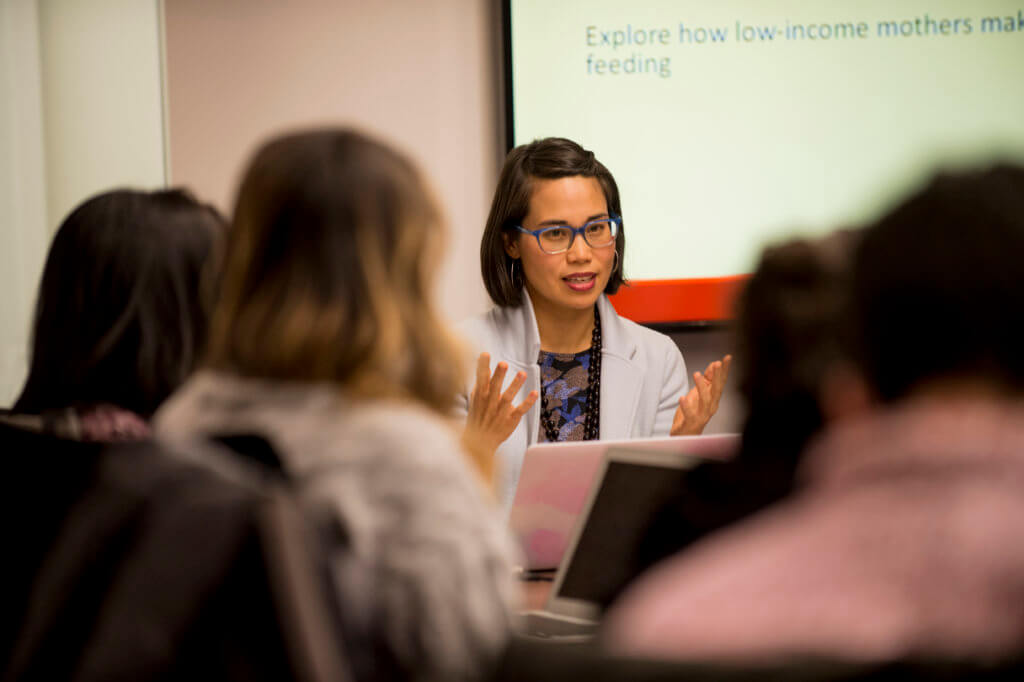Public health graduates with hands-on experience have a competitive edge when they enter the job market. At CUNY Graduate School of Public Health and Health Policy (CUNY SPH), students acquire real-world experience in the course of their studies, playing roles in faculty-led research projects and applying what they learn in the classroom in practical settings and in their professional lives.
“Experiential learning is a signature feature of the CUNY SPH graduate education programme,” says Associate Dean Ashish Joshi. “The explosive growth of our sponsored research and service portfolio has created unprecedented opportunities for students to engage. The work they produce is making a difference in local and global public health.”
Matthew Romo is a good example. His recent paper in the “Annals of Internal Medicine” demonstrated a substantial disparity in access to the top HIV antiretroviral treatment — dolutegravir — for women of reproductive age around the world. Restricted access to the drug, he notes, had an especially significant impact in sub-Saharan Africa, where young women aged 15 to 24 are twice as likely to be living with HIV as men.
Denis Nash, Romo’s mentor, is principal investigator for the Central Africa region of the International epidemiology Databases to Evaluate AIDS (IeDEA), a consortium of countries that collect observational data on 2.2 million people living with, or at risk for HIV. Through Nash, Romo was able to access this large dataset and collaborate with international investigators to assess how limiting access to dolutegravir affected women.
“Matt’s landmark research studies have immediate implications for policy and practice vis-à-vis the persisting disparities in the ongoing global dolutegravir rollout,” says Nash, who is also Executive Director of the CUNY Institute for Implementation Science in Population Health and Distinguished Professor of Epidemiology.

Source: CUNY Graduate School of Public Health & Health Policy
“We’re addressing multiple pandemics around the world – COVID-19, HIV AIDS, and the opioid crisis – and involving our students in the response is critical,” says Nash. “As a public school of public health, we’re committed to creating the best research opportunities for our students, including first authorship on publications. We put them in settings where there are opportunities for them to learn and grow as collaborators and build networks.”
Through IeDEA, Romo gained visibility in the global HIV research community, and a lot of very accomplished collaborators know him now. He obviously impressed them, and they now are a resource to him as he continues move his career forward.
When she embarked on her MPH at CUNY SPH, Hannah Stuart Lathan was already fielding questions and concerns about routine vaccines in her job as a community health educator. One of her professors was Distinguished Lecturer Scott Ratzan, a global expert on vaccine hesitancy. Recognising their shared interest, Ratzan offered her a role as a research assistant after the pandemic struck, conducting qualitative, in-depth interviews around vaccine trust. Her deep understanding of the role of community organisations in conveying trusted information to vulnerable populations impressed Ratzan. Lathan moved on to creating the New York Vaccine Literacy Campaign (VLC) with Ratzan and a leadership team at CUNY SPH. By the time of Lathan’s graduation in spring 2021, the VLC had launched with support from a consortium of funders, and she was serving as its programme manager.
“These experiential learning opportunities put students in the position of contending with unexpected challenges, and it’s where we see problem solving and leadership abilities emerge,” says Ratzan. “That kind of growth doesn’t happen in the classroom alone.”
“It’s a two-way street,” says Associate Professor Chris Palmedo, Director of the MS in Health Communication for Social Change degree programme. “We bring together a global group of professionals with widely divergent experiences and challenges. It enriches the learning experience for all of us. As a teacher, I’m gaining new insights from their unique perspectives, and they’re applying what they gain in the classroom to their professional lives every day.”
An example is Konul Karimova, who works as a Communication Associate in the Azerbaijan Country Office of UNICEF while earning her MS in Professor Palmedo’s programme. “In my work, I have realised how important it is to make communication evidence-based,” says Konul. “I’m now learning to think strategically, and design programmes to actually reach people.”
A physician’s assistant specialising in infectious disease in her home country of Ghana, Bridget Akasreku enrolled at CUNY SPH to gain a deeper understanding of the population-level drivers of disease. She is engaged in multiple faculty-led research projects and has already published two peer-reviewed papers, with five more in progress.
“I chose CUNY SPH because it is committed to serving groups that are historically under-represented in higher education,” she says. “As a female doctoral student from Africa, who is under-represented in my field of study, CUNY SPH fulfills all my needs for advanced education, namely, a diverse array of students, faculty, and research areas, and a quality that ensures a dynamic and stimulating educational environment.”
The online MPH and MS programmes at CUNY SPH offer maximum flexibility and affordability for international students. The school charges all online students the low, in-state tuition rate, regardless of where they are studying from. All MPH degrees – Epidemiology and Biostatistics; Community Health; Health Policy and Management; Public Health Nutrition;and Environmental Health Sciences – are available in online, hybrid, and in-person modalities, and students can switch from one modality to another. CUNY SPH’s cutting-edge MS degrees in Population Health Informatics, Health Communication for Social Change, and Global and Migrant Health Policy are fully online. Students can also attend full- or part-time and can switch between the two as needed.
Whether pursuing their degrees online or in person, CUNY SPH students benefit from the extraordinary commitment of faculty to create experiential learning opportunities to enhance their skills, professional networks, and ultimately their careers.
“We know we’re doing the best for our students by engaging them directly in the public health work of our faculty,” says CUNY SPH Dean Ayman El-Mohandes. “These professionals were already making a difference in population health during the course of their studies, and upon graduation they’re fully prepared to take their places as leaders in their field.”
Interested in applying for fall 2022? International students who plan to come to New York City for in-person classes must apply by May 1 to have their application reviewed in time to apply for the I-20 visa. For international students planning to attend classes online, the application deadline is August 1.
Follow CUNY Graduate School of Public Health and Health Policy (CUNY SPH) on Facebook, Twitter, YouTube and LinkedIn










